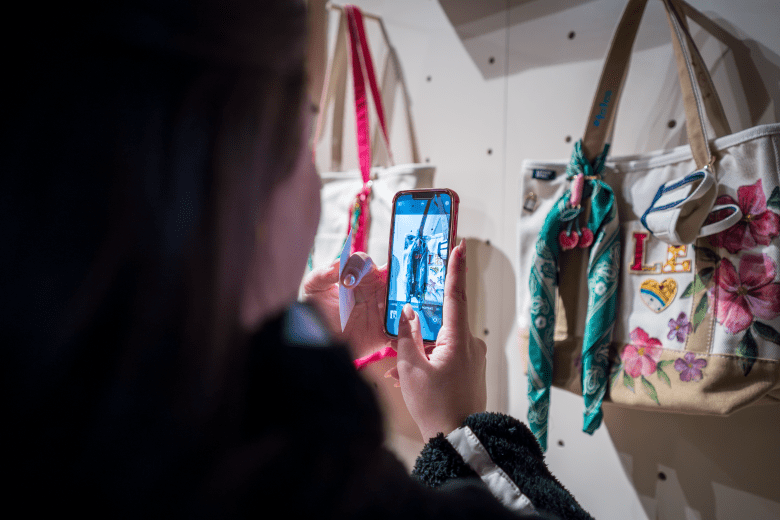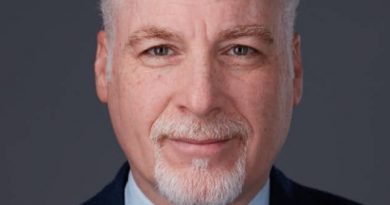Glossy Pop Newsletter: ‘We’re called influencers for a reason’ — Creators on the importance of post-election content
On November 7, Dara Levitan sat down to film an ad for a cleansing balm. She wasn’t planning to film the process of putting on her makeup before removing it, she said. But her feelings — one day after Donald Trump won his second presidential election, this time a convicted felon — took over.
“As soon as I sat down at my desk, I was like, ‘It’s so dystopian for me to be having all of these feelings and making a fucking ad about cleansing balm. … I just can’t go about this job without saying something,’” she said. The result was a TikTok over 10 minutes long in which Levitan applies her makeup with precision, while calmly delivering an impromptu speech about why she is heartbroken about Trump’s reelection. Levitan has over 364,000 followers on TikTok and over 30,000 on Instagram.
In the 10 days since the election, TikTok has been ablaze with influencers speaking out about the results and people calling out those who did not. There have also been posts about “unfollowing your faves” — as in influencers, for their failure to speak up. “A lot of y’all would not be as disappointed in your favorite influencers right now if you made more Black women your favorite influencers,” Eni Popoola (457,000 TikTok followers) says in a post with over 3 million views. Several comments on the post call out Alix Earle for not speaking up and credit Black creators (Clarke Peoples, Golloria George, Monet McMichaels) for not disappointing by making their stances known. Popoola declined to contribute to this piece.
Meanwhile, several influencers posted about feeling frustrated by the pressure to say anything. In a November 8 Instagram Story, creator Remi Bader (748,000 Instagram followers) wrote, “Done with everyone telling me i’m posting too much, too little, not the right thing. I actually don’t know what’s right or wrong to post anymore and i’m doing my best so i’m going to go back to posting my original content.”
For other creators, saying nothing feels wrong. “I have made it abundantly clear that I’m disappointed in a lot of influencers bigger than me who didn’t speak out,” said Hannah Chody (174,000 TikTok followers), who filmed herself phone banking for the Harris-Walz campaign in advance of the election. She also posted dozens of times about the importance of “knowing the stakes of the upcoming election.”
“I’m never going to call anyone out [by name] because I’m not going to put that energy out there,” Chody said. “If their [followers] want to, that’s on them. But I’m surprised by some of the influencers who didn’t say anything … or they only posted, like, ‘vote’ on Election Day. That doesn’t do anything. That’s a cop-out,” Chody said.
In an Instagram Story posted on November 6, Chody wrote, “I don’t really have the words for how disappointed I am in our country. Misogyny, racism, ignorance, greed and hate have fueled the trump base for the past decade and to see these views continue to win in defense of ‘the economy’ is horrifying. We elected a convicted felon, insurrectionist, liable rapist over an extremely competent, brilliant, and experienced Kamala Harris. Van Jones said it best — ‘he gets to be lawless, she has to be flawless.’ The rest of the world is laughing at us. History will too.”
She lost thousands of followers, she said, though, she also got plenty of positive reactions, too — an experience that mirrors the current divided nature of the U.S. political climate.
Many commenters have likely chosen not to comment out of fear of losing brand deals — and therefore, income. Levitan, however, wasn’t too concerned, given the rapid speed of social media. “If people are on your side, brands are not going to stop working with you. … If you have views and you have eyes [on your content], then, at the end of the day, that’s what they’re looking for. They’re not looking for the moral high ground. They’re looking for people looking,” she said. “And the internet has, like, a five-second memory.”
For influencers, there is a delta between observing other influencers choosing not to post and consuming content as a follower. It’s an experience Cheyenne Grenaway (66,000 TikTok followers) spoke about after a Reel she posted after the election received vitriol — interestingly, it did not stir up much controversy on TikTok. The text overlay on the post reads “Sobbed all morning, booked an IUD appointment and am escaping into my magical fairy land.”
“As a creator, I’m really trying to mind my business,” she said. “Truly, if [influencers] don’t want to post [about the election], I understand. Maybe the frustration comes more at a personal level: [People I follow] I’m supporting as a viewer, not as a fellow creator. … We’re supporting them, and we want to feel supported back.”
According to Kate Glavan (133,000 TikTok followers), “Your follow is not only an endorsement of these people and their platforms, but you are also providing them income, you are supporting them, and you are making them financially stable in this career.”
Chody added, “It might be nice to know if [an influencer is] a huge Trump supporter. I’m not saying you should be shamed and everyone should unfollow you, but I personally wouldn’t want to buy from your links because I morally do not align with you.” On a related note, in November, Google searches for the phrase “Vote with your wallet” spiked. “Social media is just in such a different place than it was even last election. People really want to take score of where you stand,” Levitan said.
Glavan built a following based on content about running and fashion and is a Global Athlete Ambassador for Hoka. But she also studied politics in school and used to write about the topic on Substack. The election has galvanized her to return to talking about politics. In a video posted on November 7, she said, “Speaking as an influencer, a lot of your favorite influencers are fucking embarrassing and fucking pathetic. To be a woman in America with a huge fucking platform and a huge audience and post nothing yesterday. Business as usual, just, I’m going to my Pilates and I’m going to my brunch. No one gives a fuck about your Amazon storefront or your fucking makeup routine. You should be ashamed when you have so many young, impressionable women following you, looking up to you as a role model.”
In some ways, creators have an impossible task. If they speak out, they will inevitably alienate some followers — though the creators I spoke to were unanimously unconcerned with this and in favor of letting their communities know where they stand. They were, it’s worth noting, all supporters of the Democratic ticket. But silence, too, is criticized.
It’s also worth noting that, at least in beauty and fashion, silence seems more common than outright support for Trump. “I don’t know anyone who voted for Kamala who hasn’t put at least a blue heart on something, and that’s all I’ll say,” Levitan said.
That said, there have been increasing alignments in recent years between certain factions of the wellness community and factions of the “MAGA” coalition. Sometimes called the wellness-to-MAGA pipeline, it may prove something to watch in the wake of anti-vaxxer Robert F. Kennedy Jr.’s nomination to lead the Department of Health and Human Services.
“We’re called influencers for a reason,” Levitan said, adding that, in speaking up, she may help one other person “be emboldened in what they genuinely believe in.” Still, speaking to the unique qualities of her profession, she said, “It’s hard to reconcile the fact that, when most people go into their jobs, they’re not required to state their political stance, and they’re not standing up at the front of their office and asking people to judge them.”
Often, particularly for creators like Levitan, Chody and Grenaway who post about fashion and beauty, commenters will say things like, “I wish you’d just stick to makeup.” But Levitan said doing the opposite of that is fulfilling for her. “It makes me feel good to know that I am using my platform for something larger than myself and something larger than consumerism and makeup. Makeup is a really powerful tool, and to me, this is the pinnacle of what that tool can be used for.”
Levitan and Glavan acknowledged that some people may feel they don’t have the right words to say or feel too uninformed to say anything about politics. And, in every interview for this story, the creator struggled to reconcile whether stating one’s political platform should be “required.” But a common theme was that no one expects beauty and fashion creators to make detailed videos about foreign or economic policy, for example.
When asked what she would say to an influencer who did not, for one reason or another, state an opinion in the 2024 election cycle, Chody said, “People really do value opinion and point of view even more than you realize, and followers are way more impressionable than you realize. It’s your responsibility to make an effort to educate yourself so that you can educate your followers. You don’t need to indoctrinate them and make them believe everything you believe in, but making them aware of the democratic process, elections coming up, how voting works, how voter registration works — that is the bare minimum you can do.” A step further, she said, would be to speak about the policies that align with values that are important to you.
According to Glavan, sharing one’s views is humanizing. “We’re in an era where people are starting to hate influencers. A lot of the appeal of influencers versus a traditional celebrity is that you have more access to influencers and they are more relatable when they talk about acne or their boyfriend dumping them. So, when influencers go back to being these robots that feel like they’re just marketing for different brands, that’s a bigger issue. … Your followers just want acknowledgment that you live in the same world as them, right?”
Pop-up of the week: Lands’ End makes a play at owning the canvas tote

Lands’ End is placing bets on its iconic canvas tote as part of a continued effort to win the tote wars. Over the summer the brand offered its Canvas Pocket Tote for just $1 to introduce customers to the product. Now, from November 15-24, it’s setting up shop at 54 Crosby Street with a pop-up dedicated to customization.
Based on the growing obsession with bag charms and other accessories’ accessories, Lands’ End’s pop-up is seizing the moment. “We have embroidery, charms, DIY charms you can make, vintage patches, pins, ribbons — and the customization is a flat fee of $15. You can do [customize] however you want,” said Kym Maas, chief creative officer at Lands’ End.
To promote the pop-up, the brand is partnering with influencers in both paid and earned capacities. It has eight key talents contracted to share content primarily across Instagram Reels and Stories. These are NYC creators (like @calebthill; 118,000 Instagram followers) and those who often post about pop-ups (including @nyc_forfree; 461,000 Instagram followers), Maas said. The brand is seeking to engage a wider, younger demographic with the pop-up. In addition, the brand will leverage paid media to raise awareness in the NYC metropolitan area.
Inside our coverage
JB Skrub’s Jill Biren on marketing to tween boys
Claire’s doubles down on fragrance to target ‘Gen Zalpha’ consumers
Beauty brands on TikTok Shop challenges: ‘We’ve had success, but at what cost?’
Reading list
The blue bracelet was meant to be a ‘safe space.’ It became a battleground.
Danielle Bernstein taps Parlux for WeWoreWhat’s fragrance foray


